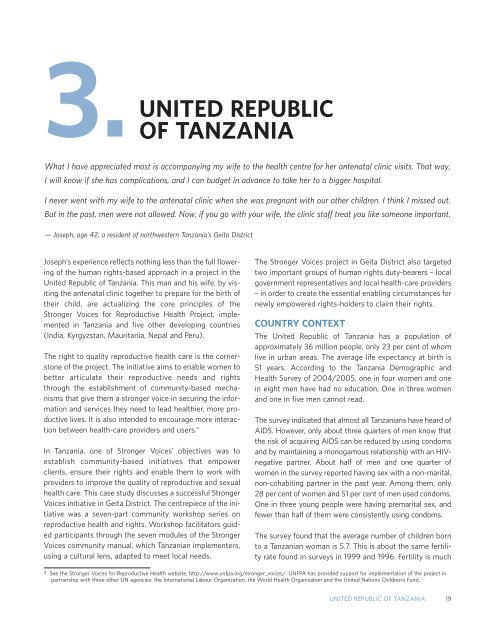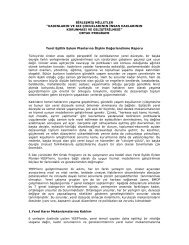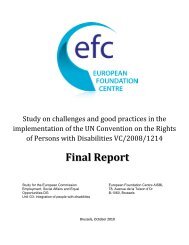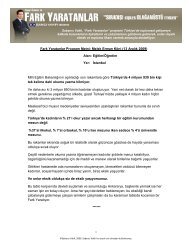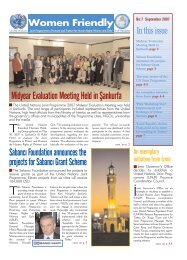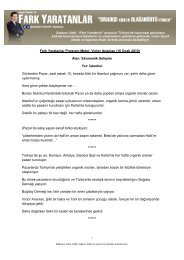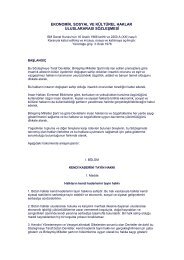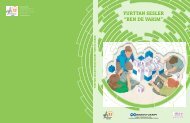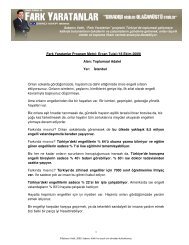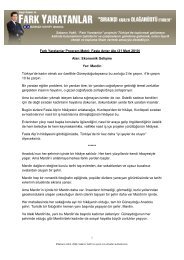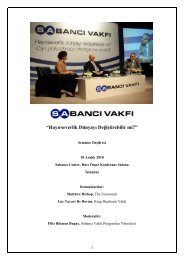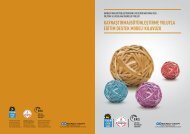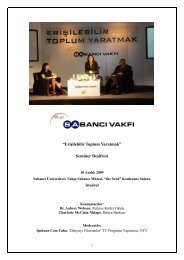3.UNITED REPUBLICOF TANZANIAWh<strong>at</strong> I have appreci<strong>at</strong>ed most is accompanying my wife to the health centre for her anten<strong>at</strong>al clinic visits. Th<strong>at</strong> way,I will know if she has complic<strong>at</strong>ions, and I can budget in advance to take her to a bigger hospital.I never went with my wife to the anten<strong>at</strong>al clinic when she was pregnant with our other children. I think I missed out.But in the past, men were not allowed. Now, if you go with your wife, the clinic staff tre<strong>at</strong> you like someone important.— Joseph, age 42, a resident of northwestern Tanzania’s Geita DistrictJoseph’s experience reflects nothing less than the full floweringof the human rights-based approach in a project in theUnited Republic of Tanzania. This man and his wife, by visitingthe anten<strong>at</strong>al clinic together to prepare for the birth oftheir child, are actualizing the core principles of theStronger Voices for Reproductive Health Project, implementedin Tanzania and five other developing countries(India, Kyrgyzstan, Mauritania, Nepal and Peru).The right to quality reproductive health care is the cornerstoneof the project. The initi<strong>at</strong>ive aims to enable women tobetter articul<strong>at</strong>e their reproductive needs and rightsthrough the establishment of community-based mechanismsth<strong>at</strong> give them a stronger voice in securing the inform<strong>at</strong>ionand services they need to lead healthier, more productivelives. It is also intended to encourage more interactionbetween health-care providers and users. 4In Tanzania, one of Stronger Voices’ objectives was toestablish community-based initi<strong>at</strong>ives th<strong>at</strong> empowerclients, ensure their rights and enable them to work withproviders to improve the quality of reproductive and sexualhealth care. This case study discusses a successful StrongerVoices initi<strong>at</strong>ive in Geita District. The centrepiece of the initi<strong>at</strong>ivewas a seven-part community workshop series onreproductive health and rights. <strong>Work</strong>shop facilit<strong>at</strong>ors guidedparticipants through the seven modules of the StrongerVoices community manual, which Tanzanian implementers,using a cultural lens, adapted to meet local needs.The Stronger Voices project in Geita District also targetedtwo important groups of human rights duty-bearers – localgovernment represent<strong>at</strong>ives and local health-care providers– in order to cre<strong>at</strong>e the essential enabling circumstances fornewly empowered rights-holders to claim their rights.COUNTRY CONTEXTThe United Republic of Tanzania has a popul<strong>at</strong>ion ofapproxim<strong>at</strong>ely 36 million people, only 23 per cent of whomlive in urban areas. The average life expectancy <strong>at</strong> birth is51 years. According to the Tanzania Demographic andHealth Survey of 2004/2005, one in four women and onein eight men have had no educ<strong>at</strong>ion. One in three womenand one in five men cannot read.The survey indic<strong>at</strong>ed th<strong>at</strong> almost all Tanzanians have heard ofAIDS. However, only about three quarters of men know th<strong>at</strong>the risk of acquiring AIDS can be reduced by using condomsand by maintaining a monogamous rel<strong>at</strong>ionship with an HIVneg<strong>at</strong>ivepartner. About half of men and one quarter ofwomen in the survey reported having sex with a non-marital,non-cohabiting partner in the past year. Among them, only28 per cent of women and 51 per cent of men used condoms.One in three young people were having premarital sex, andfewer than half of them were consistently using condoms.The survey found th<strong>at</strong> the average number of children bornto a Tanzanian woman is 5.7. This is about the same fertilityr<strong>at</strong>e found in surveys in 1999 and 1996. Fertility is much4 See the Stronger Voices for Reproductive Health website, http://www.unfpa.org/stronger_voices/. <strong>UNFPA</strong> has provided support for implement<strong>at</strong>ion of the project inpartnership with three other UN agencies: the Intern<strong>at</strong>ional Labour Organiz<strong>at</strong>ion, the World Health Organiz<strong>at</strong>ion and the United N<strong>at</strong>ions Children’s Fund.UNITED REPUBLIC OF TANZANIA19
higher in rural areas (6.5 children per woman) than in urbanones (3.6 children per woman). Women who have notreceived any formal educ<strong>at</strong>ion have significantly higher fertilityr<strong>at</strong>es. Only one in four married Tanzanian women areusing modern methods of family planning. One in six marriedwomen have an unmet need for family planning.M<strong>at</strong>ernal health remains a serious challenge. Many womendo not receive the full recommended package of pregnancycare. During pregnancy, almost all women receive <strong>at</strong> leastsome anten<strong>at</strong>al care from a health-care professional.However, only 14 per cent receive anten<strong>at</strong>al care in the firstthree months of their pregnancy, as recommended.Furthermore, fewer than half of women receiving anten<strong>at</strong>alcare are told about the warning signs of pregnancy complic<strong>at</strong>ions.Among women who give birth somewhere other thanhealth-care facilities, 80 per cent do not receive the recommendedpost-n<strong>at</strong>al care in the first two days after the delivery.HUMAN RIGHTS IN THE UNITED REPUBLICOF TANZANIAThe United Republic of Tanzania has r<strong>at</strong>ified 20 intern<strong>at</strong>ionalhuman rights instruments, including tre<strong>at</strong>ies,conventions and protocols. In 2000, it adopted the N<strong>at</strong>ionalDevelopment Vision 2025, aimed <strong>at</strong> reaching gender equalityand the empowerment of women by the year 2025, andthe Policy on Women and Gender Development. In 2001,the Commission for <strong>Human</strong> <strong>Rights</strong> and Good Governancewas established and placed in charge of promoting and protectinghuman rights as well as good governance.Tanzania has made important progress in cre<strong>at</strong>ing a legaland policy environment where women can and do particip<strong>at</strong>e.Following the 2005 N<strong>at</strong>ional Assembly elections,women make up more than 30 per cent of all parliamentarians,and the Government has the highest number ofwomen holding senior positions in the country’s history. Inits 2008 concluding observ<strong>at</strong>ions to the St<strong>at</strong>e Report, theCommittee on the Elimin<strong>at</strong>ion of Discrimin<strong>at</strong>ion againstWomen commended Tanzania for the 14th amendment ofthe Constitution, which provides th<strong>at</strong> the number of womenin Parliament shall not be less than 30 per cent. TheCommittee also expressed its s<strong>at</strong>isfaction with the introductionof legal reforms aimed <strong>at</strong> the elimin<strong>at</strong>ion of discrimin<strong>at</strong>ionagainst women, including a law th<strong>at</strong> gives women theright to acquire, own and use land equally with men and alaw th<strong>at</strong> allows a spouse to apply for a mortgage on landwithout the consent of the other spouse. The Committeealso expressed its appreci<strong>at</strong>ion to the St<strong>at</strong>e Party for its regularcooper<strong>at</strong>ion and partnership with non-governmentalorganiz<strong>at</strong>ions (NGOs) in the promotion of women’s rights.THE STRONGER VOICES PROJECTThe Stronger Voices Project was developed as a means ofdirectly invoking human rights principles to improve the qualityof sexual and reproductive health. It began in Geita Districtin April 2001 and ran through December 2006. In-countrypartners included the Ministry of Health, the Geita DistrictCouncil and the African Medical Research Found<strong>at</strong>ion, anNGO th<strong>at</strong> managed project activities on the ground.<strong>UNFPA</strong> supported the Found<strong>at</strong>ion partly because of its successfulJijenge 5 Project, which used a gender-sensitivehuman rights-based approach to build the capacity ofhealth delivery systems and community structures. Also,the Found<strong>at</strong>ion was already well established in the northernTanzanian region where Geita District is loc<strong>at</strong>ed, with aregional headquarters and an infrastructure th<strong>at</strong> encompassedmany surrounding urban and rural communities.Project goalsStronger Voices in Geita District focused on two majorgoals, and implementers chose several indic<strong>at</strong>ors (listedbelow) to measure progress toward those goals.1. Increased awareness of sexual and reproductive health andreproductive rights.• increased proportion of women who know th<strong>at</strong>spouse/partner b<strong>at</strong>tering is a viol<strong>at</strong>ion of human rights;• proportion of women with inform<strong>at</strong>ion on bleeding as acomplic<strong>at</strong>ion of pregnancy increased from 32 per cent to64 per cent by December 2006; and• proportion of women aware of the health risks associ<strong>at</strong>edwith wife inheritance increased by December 2006.2. Capacity development of rights-holders (i.e., increasedcapacity of community members, particularly women, toarticul<strong>at</strong>e concerns about their health and well-being to serviceproviders and others).• proportion of women paying for reproductive health servicesreduced from 18 per cent to less than 1 per cent byDecember 2006;• mechanisms <strong>at</strong> the community level to address genderbasedviolence increased by December 2006;5 Jijenge means ‘build yourself’ in Swahili.20SIX HUMAN RIGHTS CASE STUDIES


